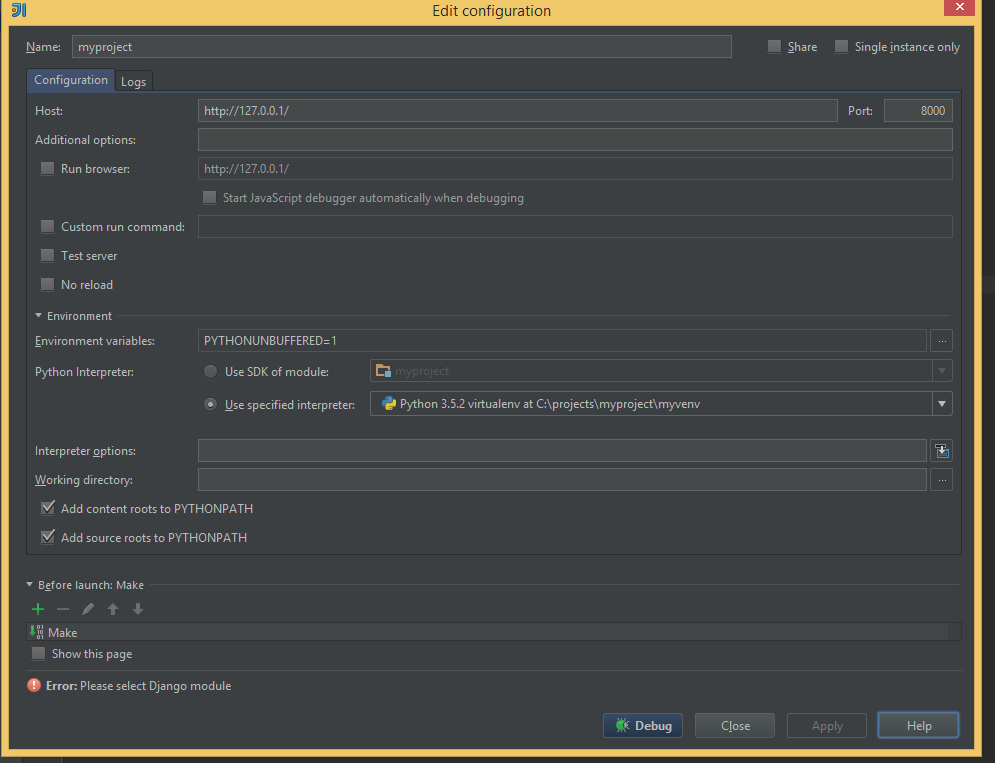Answer the question
In order to leave comments, you need to log in
How to set up a debugger for django?
Good day!
I can't set up the debugger in Intellij Idea to debug a Django project.
Can someone suggest how to get rid of the error: Please select Django module?
Answer the question
In order to leave comments, you need to log in
When you create a new project in pycharm, you need to select Django. In your case, when creating the project, pure python was apparently selected, so in the settings you need to add the DJANGO_SETTING_MODULE variable with the value projectname.settings (in your case, myproject.settings) to the environment variables (Environment variables) and install django in the myvenv environment accordingly.
Good books:
1. Stuart Ball. Analog interfaces of microcontrollers
2. Baker B. What a digital developer needs to know about analog electronics
The choice of microcontrollers is determined by tasks. It is better to choose something versatile and affordable. You can immediately take up STM32, for example, depending on the family, you can implement both simple tasks cheaply and complex resource-intensive tasks (graphics, DSP).
If the task is to collective farm something for home and family, arduins are enough.
Start with analog - resistors, capacitors, diodes, transistors (bipolar and field). And, accordingly, the theory for them (+ Ohm and Kirchhoff's law), learn to understand the CVC, the concept of a working point. There's nothing particularly complicated, just without it nowhere. And then proceed to the study of numbers - discrete logic, triggers, encoders / decoders, multiplexers / demultiplexers, adders. (All this does not need to be soldered or especially bothered - just know, as it is necessary). Knowing what it is all about and what they eat with, you will understand well how your CPU works, why the relay cannot be connected directly to the controller leg, why the LED needs a resistor, etc., etc. The knowledge of one principle frees one from having to memorize hundreds of its consequences. And yes, DI HALT has everything very well chewed - easyelectronics.ru
Do not listen to them ). I just went down a similar path. If you do this, you will study theory for a year, so that later you can connect three sensors to your controller, but most likely you will get bored with theory and you will abandon everything. Read the theory as needed, and not just like that.
Do not take arduino, take esp8266 right away, which look like arduino, then you can attach wifi and with more memory if you wish.
Then you take a sensor of something and watch how others connected it, 100% that you will find information and do the same, with time experience will appear and everything will go. ;-)
And if you want to read the theory in parallel.
There is a good telegram channel dedicated to this topic
https://t.me/Science_Community
In any electronics, you need to start with analog. And what are the goals anyway?
My son came to the 7th grade here, called to the store to buy some toy in the form of a robot. I asked him why ... it turned out, then he would need to insert a circuit into him so that he would run, jump and fight like these https://youtu.be/X0BQ_t6k-2Q?t=1m27s :))
Previously, the threshold for entering electronics was much below, because the analogue of "Hello World" was called "detector receiver" - a couple of parts, a coil, an antenna and you can listen to a couple of radio stations. Now there is complete silence on the medium waves, so it’s hard to even say what HW is now, probably something ready.
Maybe not quite for beginners, but definitely worth a look Horowitz and Hill "The Art of Circuitry
"
www.ozon.ru/context/detail/id/4446097/?gclid=CjwKE ... /www.ozon.ru/context/detail/id/5217645/
I will join the previous speakers, you need to start with an analog, or better in general, with the basics of electricity. There is an old ancient book "Radio is simple", the book is written in the form of a dialogue between Knowers and Strangers, it is read in one breath, and most importantly, everything is understood once or twice
https://tech.wikireading.ru/11098
it’s with arduino that you should start)
start by ordering Arduino nano on Ali in the amount of 2 pieces to start), buy different sensors, servos, relays, screens, etc.,. on the same Ali
, get an IDE
if you are not in electronics at all, read random literature for technical schools and colleges on transistor logic and electrical engineering.
Here is a great online MIT course if you know English of course.
https://ocw.mit.edu/courses/electrical-engineering...
Didn't find what you were looking for?
Ask your questionAsk a Question
731 491 924 answers to any question